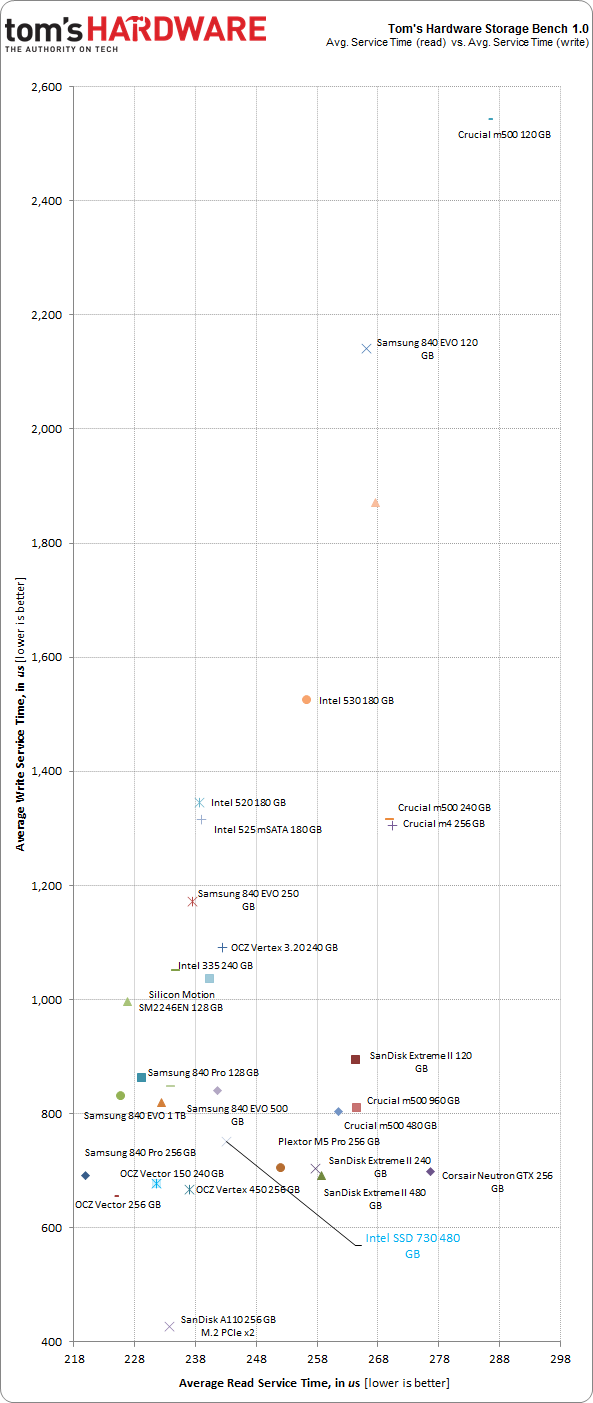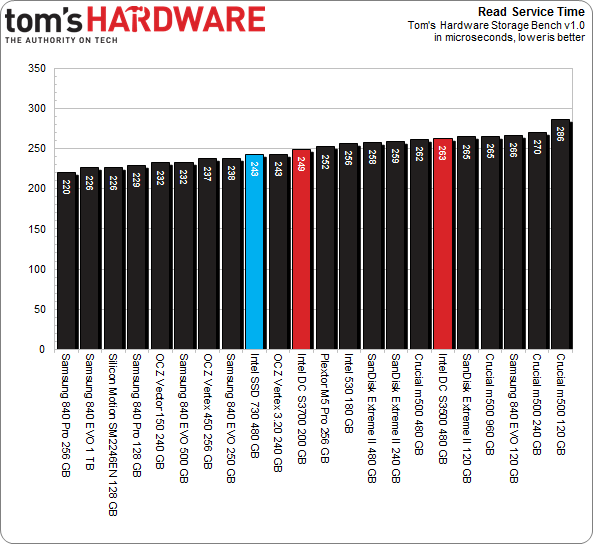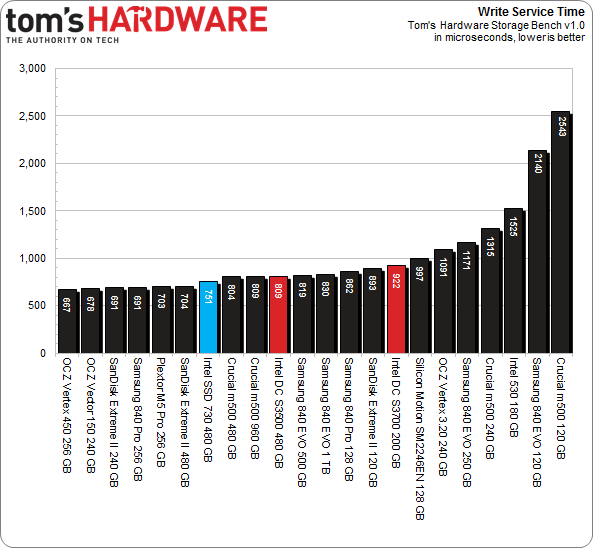The SSD 730 Series Review: Intel Is Back With Its Own Controller
Results: Tom's Storage Bench v1.0, Continued
Service Times
Beyond the average data rate reported on the previous page, there's even more information we can collect from Tom's Hardware's Storage Bench. For instance, mean (average) service times show what responsiveness is like on an average I/O during the trace.
It would be difficult to graph the 10+ million I/Os that make up our test, so looking at the average time to service an I/O makes more sense. For a more nuanced idea of what's transpiring during the trace, we plot mean service times for reads against writes. That way, drives with better latency show up closer to the origin; lower numbers are better.
Write latency is simply the total time it takes an input or output operation to be issued by the host operating system, travel to the storage subsystem, commit to the storage device, and have the drive acknowledge the operation. Read latency is similar. The operating system asks the storage device for data stored in a certain location, the SSD reads that information, and then it's sent to the host. Modern computers are fast and SSDs are zippy, but there's still a significant amount of latency involved in a storage transaction.
The swiftest SSDs show up in the lower-left quadrant of the above plot. Within that rarefied space, the SSD 730 Series shows up where you'd expect it to: forward of the Samsung SSD in write latency, behind OCZ's newest Vector and Vertex dives in both measurements, and ahead of the Extreme IIs in read latency.
When we break out the individual mean service times, we see the SSD 730 from another angle. At the head of the pack are drives armed with Toggle-mode DDR NAND, mostly. The SSD 730 lands ahead of the M500 and its more dense 128 Gb dies, but behind the technologically-enhanced 840 EVOs and OCZ Vertex 450/Vector 150.
Mean write service times for the SSD 730 are good enough to land in seventh place, again behind drives equipped with Toggle-mode DDR NAND (except for the Vertex 450, which utilizes 20 nm synchronous flash). Ten percent behind the new SSD 730 is Intel's 200 GB SSD DC S3700 with half as many dies as the new 480 GB model.
Get Tom's Hardware's best news and in-depth reviews, straight to your inbox.
Current page: Results: Tom's Storage Bench v1.0, Continued
Prev Page Results: Tom's Storage Bench v1.0 Next Page Results: File Copy Performance With Robocopy-
blackmagnum That skull on an Intel SSD means this product is the Big Kahuna. Samsung just cannot crush this competition.Reply -
Amdlova that 480 drain more than a 5400rpm HDD. Samsung or sandisk for laptops. Please next SSDReply -
rokit Never expected Intel to fail like that. Samsung still offers the best performance/power consumption/$Reply
I guess that skull did the job, power of signs )
p.s. this site has level editing in non-forum mode(the one you see and use by default)
Watch the language. - G -
mamasan2000 I don't see why the Intel SSD is any good. It's midpack at best at everything. Even my cheap Sandisk is better and it was the cheapest SSD I could get around here (besides Kingston).Reply -
unityole how is samsung the best? http://www.tweaktown.com/blogs/Chris_Ramseyer/58/real-world-ssd-performance-why-time-matters-when-testing/index.htmlsandisk and toshiba SSD, look at the chart and see the performance for yourself. Evo doing well, but thats only cause of the SLC flash helping it.Reply -
eriko All this Samsung love here... I have two brand new 840 Evo 250GB drives, and they are garbage.In fact they are so poor, I had to separate all my files, and break the RAID,and have two individual volumes, so as to have Trim enabled, and also Magician running, otherwise, terrible read and write (especially) performance resulted. I did verify they were genuine drives too. As soon as you begin to fill up these 250GB Evos, performance falls off a cliff.I'm now not a believer in TLC, and wish I had waited to get the Pro's (not available in this part of the world), as I hear much better things about them.But I've had my fill of reading reviews on consumer drives, I'm going to California in a week or so, and so I will either get 2 x 400GB S3700's, or a single 800GB S3700 (and to hell with RAID). Enterprise drives are the bomb, and don't forget that. Lost way too much time and data now with 'consumer' drives...By the way, X25E 64GB still going strong without so much as a hiccup. Not even a burp... If they made a 640GB X25E, I think I'd suck their, ok, I won't say that but you get the idea.Reply -
zzzaac Just curious, this speed, would you be able to tell that it is faster, or is it just though benchmarks?.This ssd is quite expensive at my local parts shopReply


